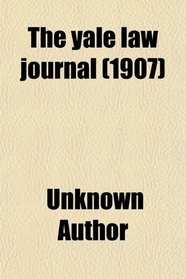Search -
The yale law journal (1907)
The yale law journal - 1907
Author:
Purchase of this book includes free trial access to www.million-books.com where you can read more than a million books for free. This is an OCR edition with typos. Excerpt from book: Criminal Law -- New Trial -- Newly Discovered Evidence. -- State v. Lilliston, 54 So. E. 427 (N. C.). -- Held, that in a criminal case, a motion for a new ... more »
Author:
Purchase of this book includes free trial access to www.million-books.com where you can read more than a million books for free. This is an OCR edition with typos. Excerpt from book: Criminal Law -- New Trial -- Newly Discovered Evidence. -- State v. Lilliston, 54 So. E. 427 (N. C.). -- Held, that in a criminal case, a motion for a new ... more »
ISBN-13: 9780217899598
ISBN-10: 0217899595
Publication Date: 9/1/2009
Pages: 492
Rating: ?
ISBN-10: 0217899595
Publication Date: 9/1/2009
Pages: 492
Rating: ?
0 stars, based on 0 rating




